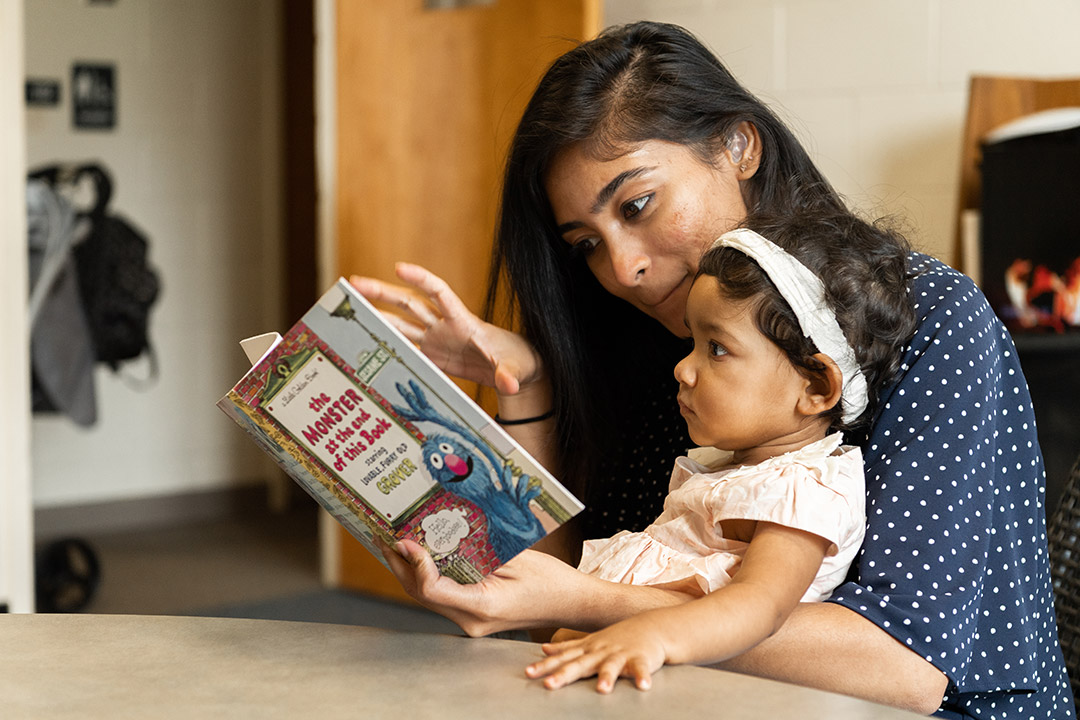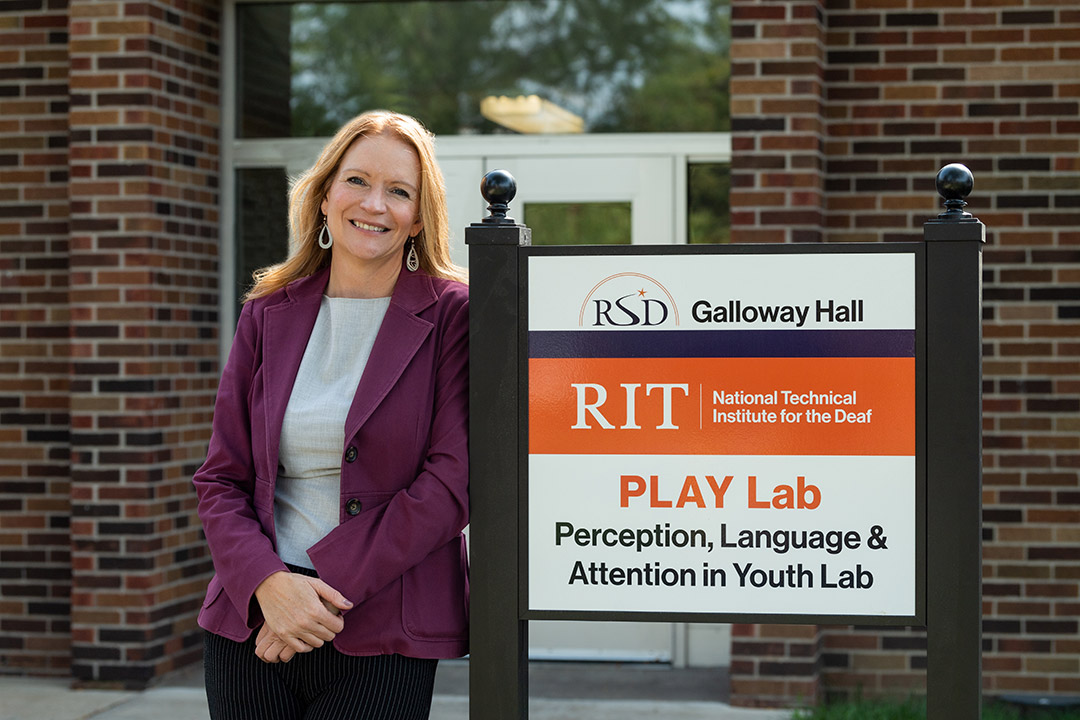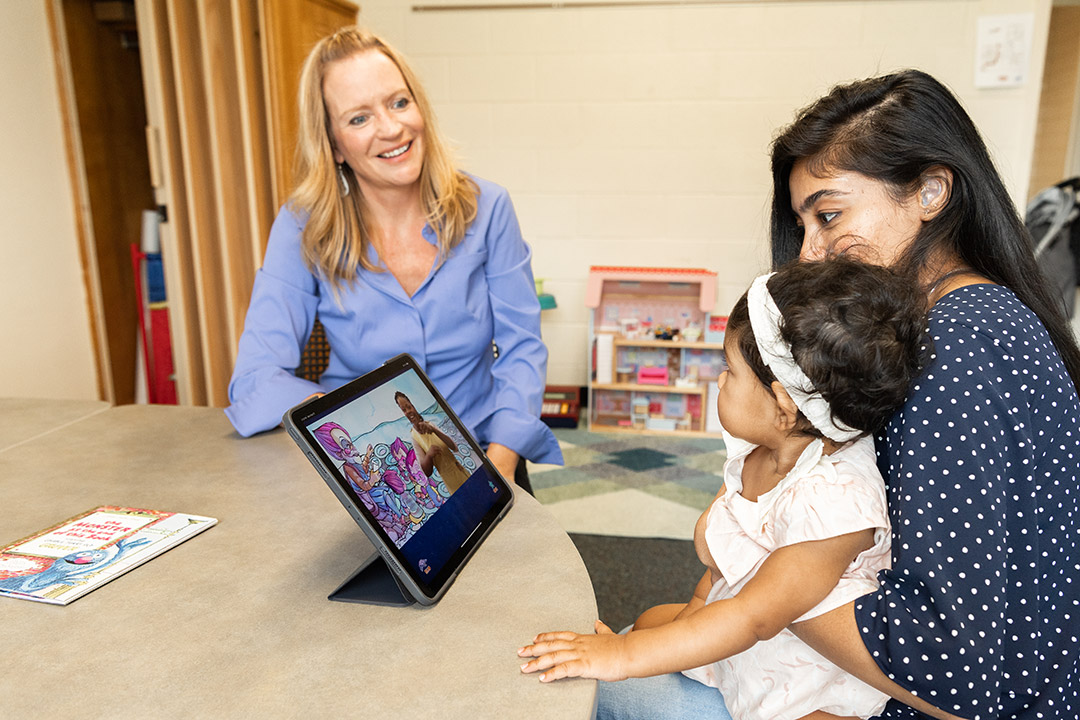New lab studies cognitive development in children
Mike Guinto
Master’s student Adrita Arefin, pictured with her daughter, is working on an eye tracking study of babies.
Rain Bosworth, who was diagnosed as deaf as a child, grew up surrounded by a loving hearing family. Her lifelong experience in this environment has become the driving force behind her research into how deaf youth acquire language and communicate even when they are unable to hear the spoken language around them.
Mike Guinto
Rain Bosworth, an assistant professor and experimental psychologist at NTID, leads research at the PLAY Lab, which focuses on how deafness and sign language impact cognition in deaf, hard- of-hearing, and hearing children ages 5 months to 5 years old.
Bosworth, an assistant professor and experimental psychologist at RIT’s National Technical Institute for the Deaf, has created a new research lab that will help scientists learn more about cognition, language, and perception in infants and young children.
NTID’s PLAY (Perception, Language, and Attention in Youth) Lab, which officially opened on the campus of Rochester School for the Deaf in January 2022, is providing parents and educators with valuable information about how deafness and sign language impact cognition. The goal is to improve the way deaf and hard-of-hearing children are taught.
Bosworth, who leads the research at the PLAY Lab, focuses mainly on deaf, hard-of-hearing, and hearing children ages 5 months to 5 years old. She and her team will gather behavioral measurements through offering the children enjoyable tasks such as toy assembly, game play, fine motor skill testing, American Sign Language (ASL) story watching, and word knowledge. Bosworth is also an expert in eye tracking, which she says allows researchers to study a child’s visual attention through measurement of eye movements and duration of eye gaze.
“All of these methods together may help us determine what deaf and hard-of-hearing children know and understand,” Bosworth said. “If they don’t know or understand something, they may not look directly at it for very long. Measuring what objects or images on a screen capture their attention tells us about what the child is thinking.”
Mike Guinto
Bosworth and her team will gather behavioral measurements through offering children enjoyable tasks such as toy assembly, game play, fine motor skill testing, American Sign Language story watching, and word knowledge.
Bosworth has always loved the field of visual cognition, a branch of experimental psychology. Her early work studied deaf adults who were fluent in ASL and who had never used assistive devices such as hearing aids. Bosworth was curious if these adults had enhanced vision because of their reliance on vision and not sound.
“I learned that the brain will compensate and develop particular strengths that work best in an individual’s environment,” she said. “These don’t always manifest as ‘enhanced’ vision, but rather ‘different’ visual abilities.”
She now aims to study deaf babies where she strives to understand how deafness and sign language impact visual cognition during development.
“All babies are born with visual strengths that help them automatically attend to the important language cues in their environment,” she said. “Babies also have an innate desire to develop relationships with other people. Language comes from that.”
As to the partnership between RIT/NTID and Rochester School for the Deaf, Bosworth said that she is hoping to give back to the school and the larger community by finding ways to assist teachers and parents. She is also providing training opportunities to research assistants and post-doctoral students.
“The PLAY Lab is an amazing place and space where we can not only engage teachers and students who are eager to learn, but also parents, who have been fascinated by the research thus far,” she said.















